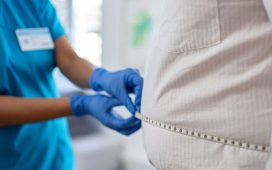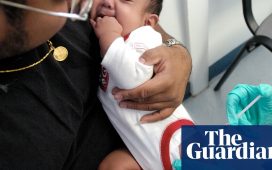A mother-of-three has credited a spider bite with saving her life — after it led to a shock cancer diagnosis.
Sabrena Jones, 54 and from Oklahoma, dismissed the initial bite on the back of her left leg for days but when it kept ‘burning and stinging’ she decided to go to the ER.
What followed was a scan and the revelation that she had stage three kidney cancer and a tumor the size of a baseball on her right side.
The former Navy reservist had surgery to remove the mass is now waiting to hear whether she will also need further treatment, like radiation therapy.

Sabrena Jones, from Oklahoma, was hospitalized for what she thought was a spider bite. But doctors then diagnosed her with stage three kidney cancer (her CT scan reveals the cancer as the large lump below the liver)

The above image from her daughter’s Facebook shows Ms Jones in the hospital after the cancer was detected
Ms Jones told Newson6: ‘I was expecting to either find out if it was or was not a Brown recluse spider bite and go home.
‘I had no symptoms at all, none. I was quite shocked [with the diagnosis].
‘But I am a believer in God, so I wasn’t really worried about it because either way I would be in a good place. I’d either be healed or in heaven.’
She also expressed gratitude to the spider, saying that if it had not bitten her she may never have found out she had the cancer until it was too late.
Describing the moment she was bitten by the spider, Ms Jones said: ‘I was just getting dressed and put my shorts on and then went outside to get in the car and that’s when it bit me. It felt like a bee sting it was so painful.’
When Ms Jones arrived at Saint Francis hospital in Tulsa she was initially given a physical exam.
A nurse then asked where it hurt, which led her to also say that she felt that there was a pain in her stomach area.
Staff then pressed on the area prompting her to yelp in pain, leading them to grow suspicious and order a CT scan — which revealed the cancer growing on her right kidney.
After the surgery in early September, she is now set to meet with an oncologist within the next week who will indicate whether she needs further treatment.
Doctors have so far told her that the cancer had not spread in her body, but surgeries do not always remove all of the cancerous cells.

A brown recluse spider like the one Ms Jones thought she’s been bitten by

The mother-of-three thanked the spider for the bite, saying that without it the cancer likely would have gone unnoticed

Ms Jones family has now launched a GoFundMe to help her cover her medical bills
She currently can’t work as she is recovering from the surgery, leading to concerns over how she will pay off living expenses and medical bills.
She has state health insurance, which has so far indicated that it help to cover the medical costs.
Her daughter Brittany Britt has now launched a GoFundMe for her mother, from Kellyville, which has so far raised $2,530 of the $10,000 target.
The mother, who also works as a nurse, has recently been struggling with anxiety and depression, according to her daughter.
About 81,000 people are diagnosed with kidney cancer in the US every year, which is one of the most common cancers in the US.
Warning signs include blood in the urine, pain in the side or lower back, constant fatigue and a lump or swelling in the kidney area.
Some patients may also experience unexplained weight loss.
Early on, the cancer normally does not trigger any symptoms — with about half of cases detected during a routine ultrasound for a separate issue.
Treatment involves surgery to cut out the cancer and then also radiation therapy to kill off any remaining cells.
Her daughter wrote online: ‘My mom was diagnosed with kidney cancer and has had it removed but she has a long journey ahead of her.
‘And with that she’s unable to work right now so she can’t pay her bills.
‘So I’ve decided to create a GoFundMe account. If you can’t donate, I ask that you at least share.’
Eight in 10 people diagnosed with kidney cancer survive, but detecting it early is crucial.
Caught at stage 1, the five-year survival rate is over 90 percent. But if it’s allowed to spread and become stage 4, it drops to just 17 percent.











